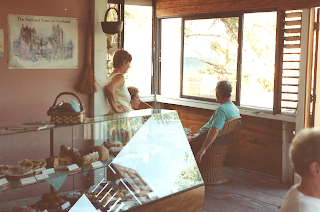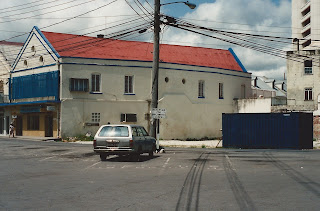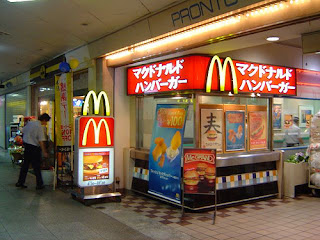 |
 by ben g by ben g |
It happened a lot in Barbados, too, but then the requests came from first tour officers in the consular section who hadn't been acquainted with the full range of government regulations yet. I know the consular training drilled in the responsibility that only a consular officer has to decide whether an applicant is eligible for a non-immigrant visa, but perhaps the training overstated how only a consular officer has this level of personal and professional responsibility. I am sure no consular officer would accept a form shoved under his or her nose by an applicant with the statement, "I just need your signature." After all, evaluation and deliberation by the consular officer is required.
Yet, when the form was a request for a petty cash reimbursement, no one seemed to think my signature required any review, evaluation, or deliberation.
But things got a mite more complicated in Abu Dhabi. My first year there, 1996, was the year that ICASS, or International Cooperative Administrative Support System, was introduced. ICASS was the successor to FAAS, or Foreign Affairs Administrative Support, which was the successor to SAS, or Shared Adminstrative Support. Each of those systems was an attempt to come up with a fair way for all the agencies at posts to get services from State and pay their fair share of the costs to State. Each version started out as a good and fair system, but over time the lines between what we State adminstrative staff must provide and what the agencies expected got blurred. And because the calculations for determining each agency's costs were based on workload counts during a predictable period of time, some agencies would make sure no requests for sevices were submitted those weeks or months to keep their costs low.
Even that manipulation of the calculations wasn't the worst aspect of FAAS, the system in place when I began with State. The worst aspect of the system was that the final decisions about the distribution of costs were made during annual conferences held in Washington where State compromised with other agencies when those agencies' representatives were more persuasive than State's reps. The bottom line was that we did the work overseas, we had to justify with every agency head at the embassy every workload number that went into the report sent back to Washington - always a contentious scenario - and in the end, neither we nor the agency reps knew what the final dollar contributions were.
Even that manipulation of the calculations wasn't the worst aspect of FAAS, the system in place when I began with State. The worst aspect of the system was that the final decisions about the distribution of costs were made during annual conferences held in Washington where State compromised with other agencies when those agencies' representatives were more persuasive than State's reps. The bottom line was that we did the work overseas, we had to justify with every agency head at the embassy every workload number that went into the report sent back to Washington - always a contentious scenario - and in the end, neither we nor the agency reps knew what the final dollar contributions were.
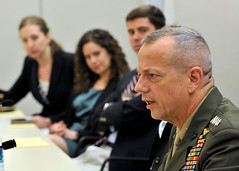 |
 by isafmedia by isafmedia Image of a Council with military and civilian representatives |
ICASS was intended to solve some of these problems. First, all the agencies at post had to form their own ICASS council which would make decisions about what services were required and what the performance standards for those services should be. Each agency at post would then determine what level of those services they needed - 100%, 60%, or 30%. All workload counts for each service were to be agreed upon up front. And no side deals would be allowed. It was the side deals that spelled the death of FAAS because they were the reason so many compromises had to be made in Washington.
My predecessor in Abu Dhabi predicted ICASS would be a catastrophe with the military agencies dictating everything. His prediction was based on the numbers - 9 military agencies vs 7 civilians agencies. Each agency got one vote in the ICASS Council and the head of the largest of the military agencies was elected to serve as ICASS Council Chair. But my predecessor's predictions were not realized. It was rocky to get ICASS set up, but it was far from catastrophic.
So what does all of this have to do with that statement, "I just need your signature"? ICASS changed the rules. That's what.
Before ICASS, there was little clarity concerning just what we in the administrative section could and could not do for our other agency colleagues. It is likely that getting that signature took longer than the requester thought was necessary because the signer had to do some research to be sure the signature was proper. It is very likely that signatures were provided when they shouldn't have been - not for any devious reasons, just because the situation wasn't clear. Those military regs sometimes gave them impression that once steps 1 through 5 were completed, the signature, step 6, was automatic. But civilian regs allowed for some variations which left that final signature as the one that affirmed all the steps up to that point were proper.
My bottom line: if you just need my signature, I just need the time necessary to review the paperwork to be sure it is complete and proper.
With the introduction of ICASS, we had to create a document that spelled out each of the services we would provide, within what timeframes, based on being provided correct and complete information needed for that step. And then we would only be able to provide those services to employees of an agency that had subscribed to that cost center at the level that included that service. I needed a flow chart to figure out when I could sign the form and - and this was the biggest difference - when I couldn't because the agency had not subscribed to the service.
Most people were not used to being told we couldn't do what they asked. And we had to get used to explaining - sometimes in excruciating detail - why we couldn't.
Here is an example. One agency did not subscribe to leasing and residential maintenance services because they discovered they could save money at post (but not for the agency overall) by providing their staff with a Living Quarters Allowance (LQA) instead of leasing residences. The cost for leases came out of their operating budget. LQA was an allowance paid out of the agency's Washington-based personnel budget. I argued that this savings would cause hardship for their 3 staff members because they would have to negotiate their own leases and work with the landlords directly to have repairs done. We, the administrative staff, would not be able to help them if the agency did not subscribe to those services.
Two of the first three of their staff members ended up leasing apartments in the same buillding where the embassy had other leases. So the landlord knew if something needed to be done, he would hear from the embassy. We made sure embassy staff members knew they had to bring their concerns to us first because sometimes what was a concern to the employee was a personal preference which we would not require the landlord to address.
So when one of the two members of the non-subscribing agency had a problem and brought it to the attention of the landlord, he ignored it, assuming that if it was important enough, the embassy would call. But we couldn't.
ICASS is still around. In fact, I work for the Washington office of ICASS one day a week. It is a good system. I just happened to be in Abu Dhabi during the teething phase.
ICASS is still around. In fact, I work for the Washington office of ICASS one day a week. It is a good system. I just happened to be in Abu Dhabi during the teething phase.
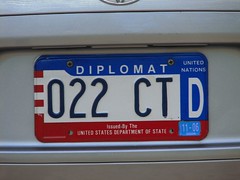



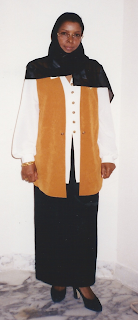








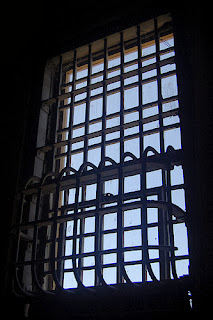

.jpg)

